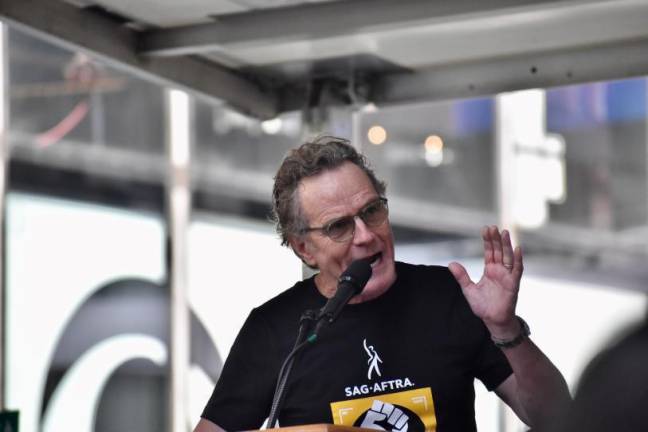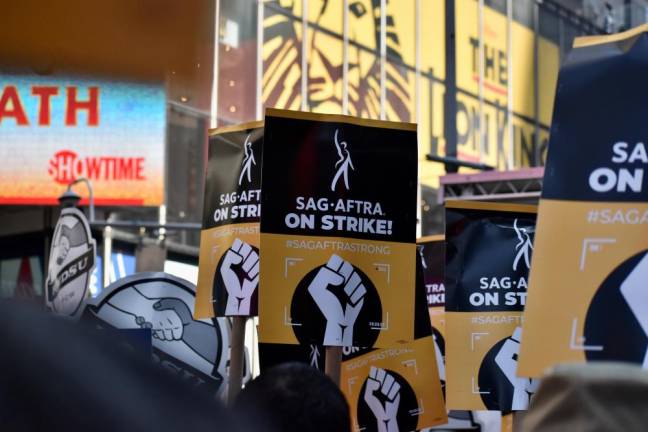New York City witnessed robust and unwavering support for the ongoing SAG-AFTRA actors strike this week. Despite a record-hitting heatwave, numerous actors gathered for a rally that took place on Tuesday, July 25th in Times Square between 44th and 43th Street. By the time 10:00 a.m. rolled around, the plaza was packed with people of all kinds—including members of the actors’ union and the Writers Guild of America.
The mood was one of indignance, unity, and solidarity. Speakers—19 in total, plus one singer—quoted monumental figures of history and fiction alike, from Frederick Douglass and John Lewis to Snoop Dogg and Star Trek’s Captain Kirk. Stephen Sondheim was sung and Rihanna was blasted (appropriately, “Bitch Better Have My Money”).
A multitude of celebrities, among them Jessica Chastain, Chloë Grace Moretz, Rachel Zegler, Bryan Cranston, and Brendan Fraser, graced the stage, making it a star-studded gathering. With unwavering determination, both genuine stars and union leaders took the stage, echoing the demands of SAG-AFTRA and the crowd. These demands included a call for modernization of the residual payment system, increased transparency, solid safeguards against the use of AI, enhancements to the union’s healthcare and pension programs, and various other vital improvements.
Several speakers stressed New York’s identity as “a union town,” and each emphasized the stakes of the strike, at turns described as “crucial,” “pivotal,” “epic,” and “an existential battle.” Those in the crowd, too, were keen to articulate the personal stakes of the moment.
“I’ve worked on network TV this year, I have a theater contract for about two months this year, and still,” said actress and filmmaker Mel House. “I can’t go to Starbucks and buy a drink. Actors work year round unpaid—we audition. I could work 30–50 hours a week, reading scripts, memorizing lines, having to spend the money on self-taping equipment. The residuals help pay for your unpaid labor.”
But chief among the issues raised by the SAG-AFTRA strike is that the residuals paid by streamers, unlike those that come from the once dominant linear TV, are negligible.
“My last residual check was for 11 cents,” said actress Jacklyn Collier. “My one before that was 81 cents. We didn’t know [that this was] what streaming was going to be. How could we?”
Certainly, “the paradigm has changed,” as one SAG-AFTRA member at the rally put it. In an fiery speech, Breaking Bad star Bryan Cranston said that the Alliance of Motion Picture and Television Producers, with whom SAG-AFTRA failed to reach an agreement, “can agree that our industry has changed exponentially.”
“We are not in the same business model that we were in even 10 years ago,” Cranston added. “They admit that is the truth and yet they are fighting us tooth and nail to stick to the same economic system that is outmoded—outdated.”
Streaming, meanwhile, remains decidedly unprofitable—each service, aside from the ubiquitous Netflix, has been bleeding money for several years. Still, their chief executives, thanks to lucrative bonuses and stock option compensation, tend to make over $25 million a year. And yet, as SAG-AFTRA Vice President, Los Angeles Michelle Hurd pointed out, over 80% of the union’s members make less than $26,000 a year, the minimum amount needed to qualify for healthcare benefits.
“The divide between the rich and the people who are—I don’t even want to say poor—deserving, is getting broader and broader, and we cannot let that happen,” she sad.
Pay disparity in the entertainment industry was referenced by many at the rally, and the enmity for studio execs—in particular, Disney’s Bob Iger and Warner Bros. Discovery’s David Zaslav—was palpable.
“If this industry can generate millions in compensation for the people at the top, it can afford to share the wealth... We will not live under corporate feudalism,” said the inimitable Christine Baranski.
Actress and commentator Nancy Giles added that “every statement released by the AMPTP, every quote by their studio heads—overpaid for decades—underscores how out of touch they are, their lack of respect for creatives and how little they seem to understand the realities of their own business.
“It is just plain absurd,” Giles added.
Arian Moayed, who plays a billionaire equity investor on Succession, said in an interview that “the whole world is being run by 10 or 15 men that have all of the companies, conglomerate-wise.”
“We, as regular workers, are trying to stop them getting even richer for shit that we’re doing!” Moayed said. “It’s like these people haven’t seen fucking Succession—it’s about you!”
“I don’t begrudge anybody who’s successful,” said Giles. “I have an issue with studio heads that for decades have been making tens of millions of dollars and getting stock options and payouts, and then tell us we need to get realistic.”
Recalling remarks made by Iger on July 13th, Giles emotionally appealed, “You were once my boss, and I know you have a heart. Please, remember that you have a heart.”
The rally’s speeches were indeed impassioned, and many invoked the labor politics of the past century. Things were generally rather buoyant, but many in the crowd felt less than enthusiastic.
“Honestly, I’m not sure I understand the point of this particular rally,” said one actress, a 30-year SAG-AFTRA member. “I think we should be outside Netflix. I’m not sure what we’re doing except feeling good about ourselves.”

